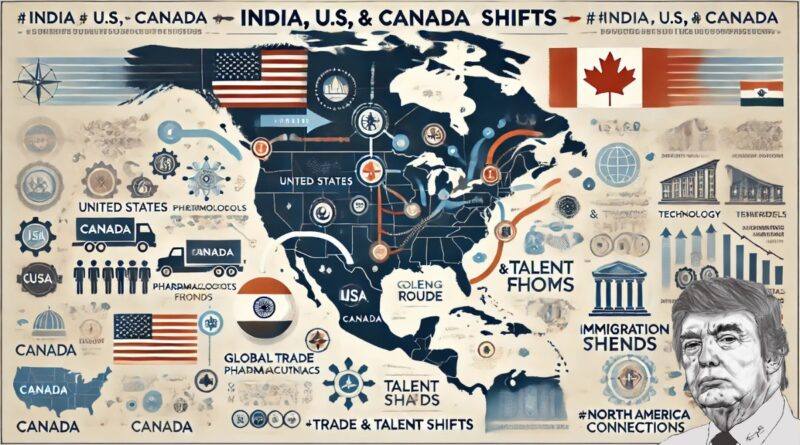Trump’s America First 2.0: A Turning Point for Indian Trade and Canadian Opportunities
On November 6th, the United States elected Donald J. Trump as its 47th president, marking his return to office after serving as the 45th president. Trump is now the second U.S. president in modern history, after Grover Cleveland, to serve two non-consecutive terms. This unprecedented victory brings a familiar yet renewed “America First” approach, with anticipated shifts in trade and immigration policies that could impact global markets, especially India’s business sector.
India and the U.S., as two of the world’s largest democracies and trading partners, will likely see this leadership change impact several critical areas for India. Trump’s trade policies have historically aimed at reducing the U.S. trade deficit, often criticizing India’s high tariffs and protectionist measures on American goods. His return may mean higher tariffs and more rigid trade terms, which could create challenges for Indian industries heavily reliant on exports to the U.S., including technology, pharmaceuticals, and textiles. However, the possibility of more restrictive U.S. immigration policies under Trump may divert skilled Indian professionals to Canada, shifting talent flows and potentially strengthening Canada’s position as a tech hub. This could also open up new opportunities for India-Canada trade relations, offering a silver lining amidst the challenges.
These developments could redefine North America’s economic landscape, creating challenges and opportunities for Indian businesses, professionals, and the broader Indian diaspora.
The re-election of Donald Trump signals a likely shift in U.S. trade and immigration policies that could significantly impact India-U.S. trade relations, Indian professionals in the U.S., and even Indian Canadians. Trump’s ‘America First’ approach may involve revisiting high tariffs on Indian goods, affecting industries like technology, pharmaceuticals, and textiles—key Indian exports to the U.S. If the Trump administration implements stringent tariffs, Indian exporters could face new barriers, leading to potential losses in revenue and competitive disadvantages in the U.S. market. These stringent tariffs may also press Indian companies to seek alternative markets, possibly strengthening trade with Canada, the EU, and other Asian markets. For Indian professionals in the U.S., tightening immigration policies could mean increased competition and potential job insecurity, leading some to consider moving to Canada for better opportunities.
Trump’s stance on immigration, especially regarding H-1B visas, is another crucial aspect with global implications. During his first term, Trump initiated restrictive measures on H-1B visas, limiting the entry of skilled foreign professionals into the U.S. Should he take a similar approach now, skilled Indian professionals may increasingly look to Canada, where immigration policies remain welcoming and supportive. Canada’s Global Talent Stream, a fast-track immigration pathway for tech and engineering professionals, is already attractive to Indian talent. Tighter U.S. immigration policies could accelerate the shift of skilled professionals from the U.S. to Canada, helping Canada establish itself as a highly attractive destination for highly skilled technology, healthcare, and academia workers, potentially becoming a global tech hub.
For Indian Canadians, this trend could strengthen the community and its economic influence in Canada. As more Indian professionals choose Canada over the U.S., Canada’s tech and healthcare sectors stand to benefit, potentially creating a ‘brain gain’ effect. Moreover, if Trump revisits parts of the United States-Mexico-Canada Agreement (USMCA), cross-border business dealings for Indian Canadian entrepreneurs might require trade policies or tariff adjustments. While new policies could present hurdles, Canada’s robust trade frameworks and trade agreements with both the U.S. and India could provide a buffer, allowing Indian businesses in Canada to remain competitive and contribute to the growth of Canada’s economy.
In addition to trade and immigration, these geopolitical changes may influence cross-border family networks as travel or work in the U.S. becomes more complex for those facing tightened immigration policies. Canada’s growing appeal as a stable, immigrant-friendly destination could further position it as a hub for skilled Indian professionals, enhancing its reputation globally.
As North America rebalances its trade and immigration landscape, Canada may emerge as a preferred destination, providing stability and opportunity for Indian professionals and investors looking for growth in a changing global economy.
Feature Image: DALL-E




